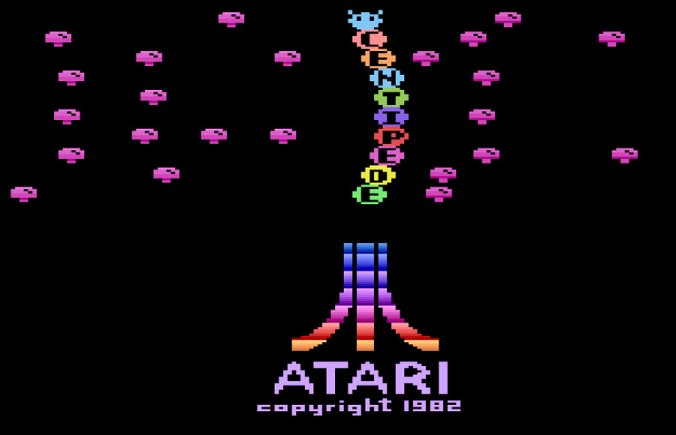
A giant centipede descends over the garden gnome’s mushroom forest, Centipede. Copyright Atari, Inc.
I found myself with words, but unable to make the journey to the House of Words. To trek across the unnamed ocean, where the volcanic islands breathe the salt, takes days, or more specifically: nights. The House of Words, etched over the obsidian remains of an infertile mountainside, does not visit with the sun. Only the dungeon folk, writers of tales and things that crawl and ooze and bite, smear their ink over the bookshelves.
I paddled one night over a year ago, on a borrowed boat made of teak wood varnished in bright red, the bright red of an ambulance’s cross. Thoughts of a classic paranormal tale – a wailing widow void of teeth that rubs her gums to your earlobes behind the pillow, maybe the ghastly apparition of a two-legged horse wearing your grandma’s face – whooshed around my head as I dug into the quiet waters with my black paddle, splashing my old hiking backpack and disturbing insects that also whooshed around my head, hungry for words.
They said to bring your unique experience into your writing to make your art authentic, I thought as I pulled the red dragon boat onto the ashen gray beach. I plopped myself down exhausted, breathing in the humidity I so hungrily missed. I let it enter my mouth and come out my nose, panting like an angered beast. How did I row for so long alone on such a large boat?
Bugs.
Bugs fueled my aching body. Mosquitoes prickled the skin, savoring every juicy drop of blood consumed. The cockroaches tickled with their stiff antennae and itchy wings under my naked feet. I see them all fleeing the vessel now and decide to go for a walk thinking of ghosts, mangoes, and worms. Then, I shove my hand into the backpack, ignoring the tappity-tap of a hundred spider legs and grab the pen.
Hungry Enough, Chapter 1
“I’m so hungry I could eat my left foot,” Sun said, slamming her head, bangs first, into the kitchen counter.
“Don’t be so melodramatic, Sundiata.” Kale dropped his messenger bag on the stool beside her, grabbed the faux leather strap and used it to poke a few times through Sun’s draping black hair. The girl responded by biting it, lifting herself and speaking through gritted teeth. “Only my mother calls me Sundiata.”
“That’s because your mom is a super cool gal.” Kale tapped his friend on the nose twice with an index finger.
Sun tried to bite that too. “Cool? Incorrect. Did you know Sundiata is a man’s name?”
Kale shrugged with both face and shoulders, his freckles temporarily rearranging but still highlighting his Nordic reddish hair.
“An African man’s name,” Sun continued, eyes opening wide for emphasis. “Kale, are you listening? I’m Asian. And a woman.”
“Ah, is that why you love wearing burgundy boots and paint yourself with crimson lipstick?” Sun shot him a look. He knew the look. “At least you weren’t named after cabbage,” he said and smiled. Then she smiled. “There it is. There is my smile.”
The hushed discussion by the apartment’s oak front door rose enough decibels to beckon for attention.
“You’re leaving,” said one of the two girls, standing inside the awning. She still wore her coat, a military green jacket that covered her whole, from short auburn hair to long winter boots. “I can’t believe you. Sun needs me. We talked about this, Luz. Come in. Please.”
Luz looked to her feet, both firmly planted outside. “Cherry, it’s just,” she paused and bit her lip. “You don’t know. You don’t understand how this thing is for me, for us, for my family. I’m… I’m sorry, Cher.” Luz had an accent. Her R’s would roll for days as her words rushed out in hurried breaths. “I can’t.”
Cherry grabbed Luz’s hands. Even now, angry as she was, the way her girlfriend’s cream-colored skin and turquoise nails contrasted her own pale hands and red gloss warmed her heart. “It’s ok. I won’t force you.”
Luz’s hands, specifically her left, began to shake. She unfastened Cherry’s grip, gazed directly into her otherworldly greens and gave her a peck on the lips. “Lo siento,” she said, apologizing. Then she ran down the corridor, feet sloshing over the checkered carpet, holding her left wrist with her right hand and muttering something in her native tongue. The halogen flickered on and off twice.
“Sun, you really should report these lights to the super,” Kale said, approaching. “You ok, Cher?”
Cherry slumped against the open door and shook her head.
“Let me grab your coat. Come. It will be fun. Dinner for three. Like at school.” With Cherry’s jacket in one hand, he pulled his friend close for a hug and whispered, “Sun is starving, and you smell like cookies.”
The girl blushed then rolled her eyes. She closed the door with a slow and painful scraping noise, the kind doors make when the frames swell in the artificial heat and yelled “When are you ever not hungry, Sun!?”
Sun grinned, already plopped down over the dinner table, serving herself a plate.
“Not wasting time, eh?” Kale grabbed his bag from the kitchen, dropped the jacket and pulled out a chair. “Come sit, Cher.”
“Looks beautiful, Sun,” Cherry said, admiring the ocean blue cloth covering the table. Seven tall candles topped off a silver candlestick. Four curvy glasses sparkled with delicious libations. The plates were a luscious pearl white, rimmed with brushed nickel. Admiration swooned then fled when she regarded the forks. “Plastic?”
“We’re still not completely moved in,” Sun said through a mouth full of pasta. “The new silverware is at my parent’s house in New Hampshire. Maybe somewhere in there.” She pointed to the living room, host to two leather sofas in contrasting white and black, a pile of cushions on top; one unplugged LED TV, still half-buried in its packing frame; and an army of boxes: Tall brown ones scribbled with purple Sharpie, shorter flatter ones taped with grey and several other beat-up remains which had seen war.
Kale dimmed the lights and lit the candles. “Now, about that gift exchange at work,” he said, rummaging inside his bag.
“You found one?” Sun perked up, hurrying a meatball down the chute with vodka tonic. “Where did you find it?”
“Find what?” interjected Cherry.
“This.” Kale pulled out a broad, sharpened knife, curved at the edge and about seventeen inches long. The blades were sharp and precise, and the hilt formed with burnt wood. “It’s a machete, or in English: machet; though no one calls it that.”
Cherry’s plastic fork dropped on her plate. Her jaw tried to follow.
“Wow, looks amazing,” Sun said, reaching out. “I didn’t expect it to be this big. It’s like a short sword. May I hold it?”
Kale handed over the weapon. Sun held it to the candlelight and watched her reflection while caressing the rough steel with curious fingers. Her eyes resembled two thin snake slits. She ignored the distortion, rose from the metal chair and wielded the machete, feeling out its weight. The girl gyrated it on her right hand, triceps tensing, and almost hit the corner of the table.
Cherry’s jaw found the plate and said hello to the fork.
“Sun’s dad collected swords,” Kale said, “but this one isn’t for Sun’s dad, or for Sun, no matter how badass she looks dressed up as Wonder Woman.” Sun frowned in surprise. “Hip-mom posted your teenage years online. Watch out Gal Gadot, here comes Sun, the Hun!”
Sun hardened her grip over the cutlass. “Jesus, Kale. My adoption papers said Korea, not Mongolia!”
“Is someone going to tell me this story?” Cherry stood and planted both hands on the table. “I should be enjoying a nice holiday meal at my friend’s new condo, with her new husband, while showing off my,” she pointed with thumbs at her chest, “my new girlfriend. Instead, the husband is out of town – really, the day after the honeymoon? – my girlfriend’s borderline-psychotic paranoia sent her running, and my best friend – you, Sun – is getting drunk on vodka and gorgonzola while playing medieval times with a machet over the dinner table!”
“Machete,” Kale said, taking a sip from his glass. “I told you no one calls it machet anymore. And, it’s still used in contemporary agriculture throughout the Caribbean. Not medieval times.”
Cherry grunted, crossed her arms and sat down. A lone lock of hair dropped over her face and she blew it out of the way with a puff.
“Story time?” asked Kale.
“Story time,” said Sun. “Cher, we tell you the machete story, then you tell us about Luz’s mystery trip.”
Cherry nodded.
The lights turned off. Sun held her phone with one hand, long knife still in the other. “It’s all automated. I control everything with an app.”
“So, it’s about my boss – el jefe – like he calls himself,” Kale started and slumped into a chair.
“Our jefe,” Sun said, lunging forward with the machete and piercing an imaginary foe.
“He’s Puerto Rican–“
“Like your new girlfriend.”
“Sundiata, stop interrupting!” Kale pulled Sun by the arm to the chair beside him. “Drink more vodka. Stuff yourself with another meatball. I’ll let you tell the part about the worms.”
“There’s worms?” Cherry shifted in her seat and tried to straighten her mini skirt over the black leggings.
“Turns out, el manager hates raw eggs,” Kale said.
“Lots of people hate raw eggs.”
“Not like this, Cher. Not like him. He told us–“
“Tell it from his point of view.” Sun bared teeth, then pursed her lips.
“Great idea. Now SHUT IT.”
Sun gestured zipping her lips closed.
Kale leaned forward, red hair seemingly on fire by candle’s light, and cleared his throat.
“’Growing up, my mother, first to attend college in the family, worked full time. Abuela Lucía watched my older brother, and for a short time, welcomed me under her roof too. She owned a white concrete house, a corner house, a real huracán stopper with a big backyard rich in mango trees. My brother and I loved climbing up the rough trunks, dashing through branch after branch, freeing the delicious fruit from its natural shelves. Most people know mangoes for their refreshing taste. My brother and I knew them for the sting of a well-aimed throw. One day, while Abuela napped, we took down a few dozen and went to war. We plastered the walls orange yellow by noon after blasting each other over grass and tree root for hours. When Abuela Lucía peeked through the aluminum windows and caught wind of our mischief, she marched outside in her sleeping gown, stepping over torn mangoes with bare feet, throwing insults, chancletas and contempt. I remember the pain of the beating, and the smell. The entire yard smelled of the glorious fruit. Whenever I inhale the aroma now, I swear my backside burns.
“’Soon after, they shipped me over to Aunt Julia’s house. Aunt Julia’s house wasn’t new or modern like Abuela’s. Termites had devoured half the wooden second story. The floors creaked with your footsteps like two-pound crickets mating up a storm. The bedrooms smelled of wood rot and moist earth and the stench carried under your nose from sun-up till the starry night. I loved it there. My cousins, older and bigger boys, both brawny and sweet, taught me how to wrestle on the cool linoleum floor. My uncle let me feed the chickens. He had raised over three hundred birds, including a pain-in-the-ass bronze and gold cockfighting rooster, in chicken coups he had erected on cinder blocks and wood.
“’Breakfasts were the best: Freshly squeezed lemonade and still-warm eggs. Aunt Julia prepared them scrambled, over hard, over easy, runny, boiled, fried – any way you can imagine. I preferred them soft-boiled and soupy back then. Not now. Now I can’t stand the potent color or their earthy smell – no uh. Not since that day…’”
Sun put a hand on Kale’s shoulder. He nodded. She threw back her straight black hair and continued in a monotonous tone.
“’Not since that day, that hot and humid morning over the dark brown polished table and old mahogany chairs. Aunt Julia served me up the yellow mush and right after my spoon invades the dish, a centipede – longer than ever seen by my four-year-old eyes – dropped from the chandelier into my egg soup. The worm wreathed, a hundred tiny insect legs squirming, splashing yellow slime in my milk, on the table, on the walls – on me – my eyes, my mouth, my hair. I screamed, pushed away from the table but the chair, too heavy, pulled back. I cried out again watching it contort. My cousin darted behind me, torn Superman shirt whizzing by, and with the longest-looking knife I had ever seen, sliced the creature in two with a snap. The two halves of the whole moved even faster, spreading more filth on my breakfast, consuming my food, and with it, my sanity. My cousin lunged again, and again, until the centipede itself became soup and the nightmare went to sleep. I went rigid, mouth agape, yolk dribbling over my lips; eyes fastened, locked, pupils dilated. I watched. All I could see was…’”
Sun gave her weapon a twirl.
“The machete,” said Cherry, eyeing the tool. “You bastards.”
“It’s a better gift than a box full of worms over duck sauce,” said Sun with a grin. “That was Kale’s first idea.”
Cherry looked at her pasta, took a hand to her mouth and ran.
“She’s going to barf,” said Sun, putting down the machete and raising a hand to her partner.
“No-look high-five!”
“Nailed it.”
“Should I check on Cherry?” Sun said, wetting her lips on a fresh vodka tonic. Kale sat across from her. He in the white sofa, she in the black sofa, both bathed by incoming moonlight from the living room’s arched windows. “It’s been five minutes. I’m worried.”
“Don’t be.” Cherry walked in, candlestick in hand, and floated down next to Sun. “It’s me that’s worried about you, Sun,” she said placing nature’s flashlight on a tall, brown box. The candle’s wick danced on her pale face, revealing swollen eyes and wet hair.
“Were you crying, Cher? The story is just an office joke.” Sun placed her glass on the hardwood. “Come here,” she said and embraced her friend.
Cherry allowed it, enjoying her warmth, then pushed her away gently and grabbed her shoulders. “I didn’t want to tell you. God knows the only spirits I believe in are the ones we swallow at the pub.”
Sun tilted her head, confused.
“It’s too much of a coincidence: the story… the grandma,” Cherry nodded toward the machete in Sun’s lap. “And that thing.”
“What is it, Cherry?” Kale switched sofas, clumping them closer.
“Luz’s family is superstitious as sin. I’m talking candles – big candles like bug-spray cans – rosary beads and Christ on two sticks on the walls, in the books, underneath her white satin nightshirts. You know I didn’t want to tell you about her trip. She confided in me. Me!” The girl swiped one hand through her head, pushing auburn lace to the side. “Yet, you ask me about it every time. Every damn time. Well, tonight I’ll tell you. And not from her point of view or impersonating abuelas and talking about hurricanes and whatnot. You two can be so disrespectful.” Cherry dangled an index finger at her friends, charm bracelet jiggling. “And doctors!”
“Anesthesiologists.” Sun smiled and turned to Kale, but he frowned and shook his head.
“Last year, when Luz flew home to help with Hurricane María relief, her sister was attacked. One of those in-the-wrong-place-at-the-wrong-time tragedies. Not only attacked: Murdered.”
“Oh my God…” Sun gasped, right hand instinctively tightening over the wooden hilt. “I-I didn’t know. I’m so sorry, Che–“
“Don’t interrupt.” Cherry furrowed her brow, her gaze focused. “Luz, my beautiful, kind and caring Luz, got it into her head that it was her fault. That her sister’s murder, a murder by ‘fatal head trauma from a sharp and elongated knife’ at the hands of two sick men very angry at their government – was meant for her.”
“What? Why?” said Kale. “You can’t control calamity. You can’t predict insanity. Why would she say that?”
“Luz suffers from an illness, a tightness on her left wrist; something the doctors call nerve compression. She describes it as the feeling of someone forever holding or grabbing, and at times, clawing her. After several years of unsuccessful PT she says she’s learned to cope with it.” Cherry paused and exhaled. “This is where things get weird, and downright creepy. Her grandmother insists it’s not a disease but a blessing; says Luz is protected by a Hupia she herself bound to her granddaughter’s arm the instant she came out of her daughter’s womb.”
“A Hupia?”
“A wandering spirit in Taíno legend. The Taíno are the indigenous people of Puerto Rico, the ones conquered when the Spanish arrived. The culture still survives in villages spread across the island. They celebrate the many gods, prepare the food, practice the language – they sell t-shirts online with the stuff.”
“What does that have to do with Luz’s sister?” Kale chugged half his scotch. “This hoopla thing and the murder happened decades apart.”
Sun only stared.
“That day, at the wrong place and the wrong time, Luz couldn’t answer the door because her nerve compression flared. The moment she stood, the pain overpowered her, making it impossible for her to move. Luz said she felt like a man made of stone clamped down with pincers over her wrist. When she couldn’t move, little sister went instead, pulled open the door and,” Cherry closed her eyes, “I stopped reading the news article after ‘thirty-seven lacerations.’“
“Say no more, woman.” Kale downed the rest of his drink, leaving a wet trail on his chin.
“Luz watched her sister bleed to death on the floor ten feet away. Then, through moribund half-sobs and her own screams, she heard a car’s tires screech and the pain disappeared.”
“I’m going to need more scotch.” Kale rose and stumbled through some boxes and into the kitchen. “I’m done with machetes,” he said, voice drifting away.
Cherry stared out the window. The night sky had clouded. The moon disappeared. She wondered whether freezing rain would follow. “Sun, is tonight your first night alone in the new condo?”
“Yep,” Sun said, head hung low.
“Will you please be careful?”
Sun mumbled a yes. “Cherry?”
Cherry cupped her friend’s hand.
“What happened to the Hupia?”
“Luz said the pain was unlike anything she felt before and unlike anything she would feel again…” Cherry looked down, admiring her friend’s strong hand and black nail polish. “Until the moment she knocked on your door.”
Enjoyed these creepy crawlers? You might also like Simon’s Quest. Leave a comment or share with others. Feedback, thoughts and speculation are welcome too.
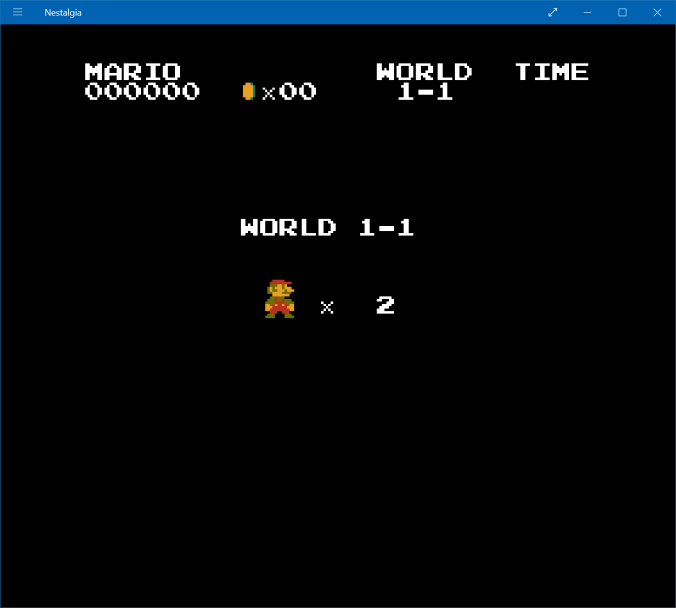
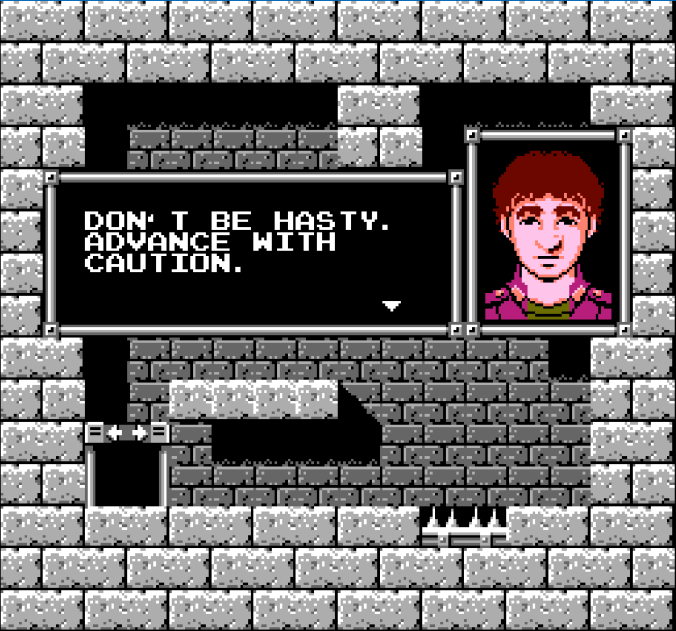
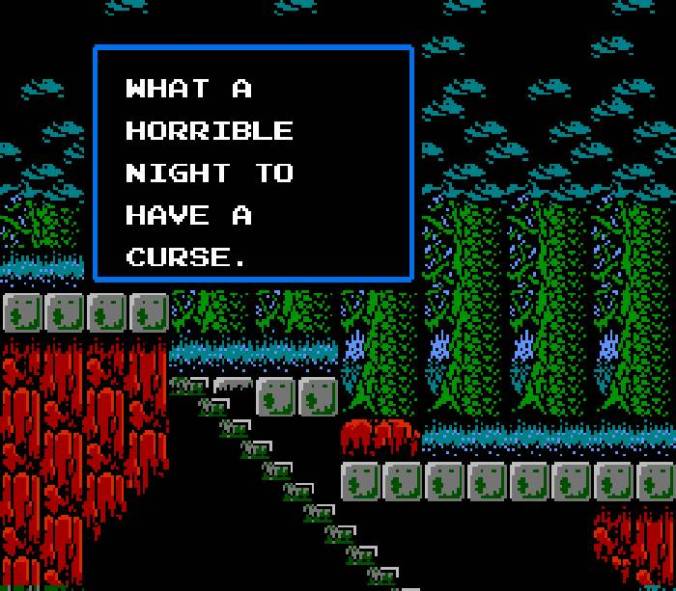


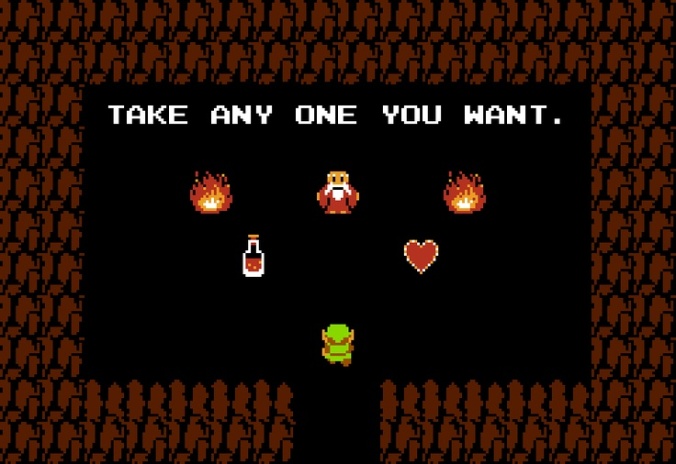
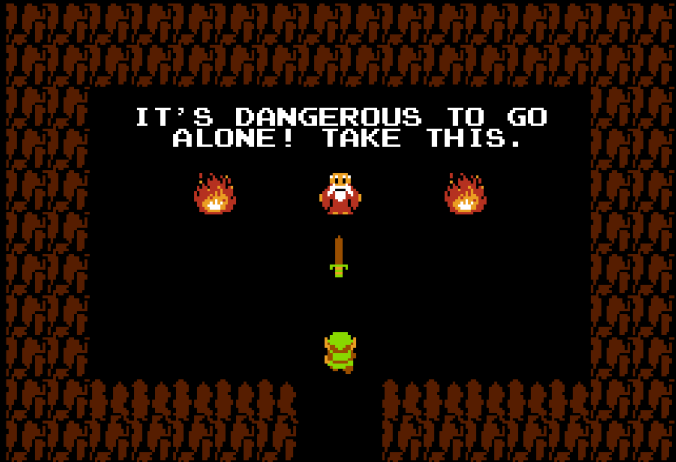
 My father’s spirits walked me across in 1979. The gateway still exists today, buried deep under the sand behind a lemonade stand, crumbling toward time. Humanity received me in an island city named after a Spanish conquistador.
My father’s spirits walked me across in 1979. The gateway still exists today, buried deep under the sand behind a lemonade stand, crumbling toward time. Humanity received me in an island city named after a Spanish conquistador.